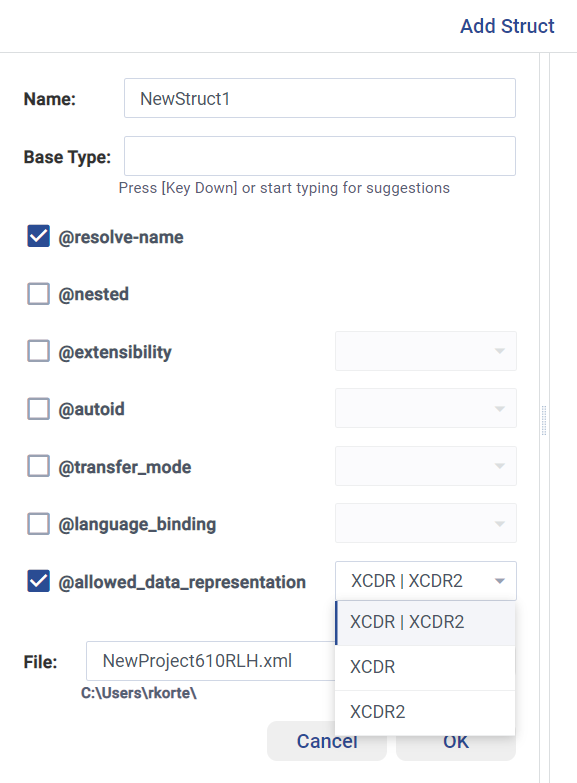4.2.3. RTI Connext Tools¶
4.2.3.1. Tools won’t work on some operating systems¶
On a Linux platform, RTI Admin Console and RTI Launcher require at least GTK+ 3 version 3.20.0 and its dependencies. Admin Console also needs to have at least Cairo version 1.9.4 and its dependencies. As a result, these tools might not be able to run on operating systems that use older versions.
4.2.3.2. RTI Launcher: Previous releases could propagate some environment variables on macOS systems¶
Previous versions of Connext could propagate some environment variables between multiple terminals. This could happen when opening some applications from Launcher, on macOS® systems only.
This issue has been fixed in 6.1.0, but some environment variables (such as JREHOME or NDDSHOME) could be still set if previous versions of Connext (before 6.1.0) are executed.
To work around this problem, it is enough to open a new terminal before launching any other application from a previous Connext version.
4.2.3.3. RTI Admin Console¶
4.2.3.3.1. Potential crash on Linux systems when Security is enabled¶
Applications using RTI Security Plugins may fail in systems with a default OpenSSL version prior to 1.1.1 (such as SUSE Linux Enterprise Server 12 SP2). This happens, for example, with Admin Console.
A workaround for this issue is to set the LD_PRELOAD environment variable
to:
export LD_PRELOAD=$NDDSHOME/resource/app/lib/x64Linux2.6gcc4.4.5/libcrypto.so.1.1:$NDDSHOME/resource/app/lib/x64Linux2.6gcc4.4.5/libssl.so.1.1:$LD_PRELOAD
See Dynamic Linking, in the RTI Security Plugins User’s Manual for more information.
4.2.3.3.2. Subscribing to Topics may require change in partition security permissions from previous releases¶
According to <NDDSHOME>/resource/xml/RTI_ADMIN_CONSOLE_EXAMPLE_PROFILE.xml,
entities created by Admin Console (for example, the DDS:Security:LogTopic DataReader)
will, by default, publish and subscribe to the empty partition and any other partition:
<qos_profile name="Default" base_name="ExampleAdminConsole::BaseProfile">
<publisher_qos>
<partition>
<name>
<element></element>
<element>*</element>
</name>
</partition>
</publisher_qos>
<subscriber_qos>
<partition>
<name>
<element></element>
<element>*</element>
</name>
</partition>
</subscriber_qos>
If Admin Console is enabling security and using the above QoS, then Admin Console’s Permissions Document must allow the creation of those entities. As a result of the fix for SEC-1245 (see Fixes Related to Access Control, in the RTI Security Plugins Release Notes), the Permissions Document must now allow the * partition, as follows:
<allow_rule>
<domains>
<id_range>
<min>0</min>
</id_range>
</domains>
<publish>
<topics>
<topic>*</topic>
</topics>
<partitions>
<partition>*</partition>
</partitions>
</publish>
<subscribe>
<topics>
<topic>*</topic>
</topics>
<partitions>
<partition>*</partition>
</partitions>
</subscribe>
</allow_rule>
Alternatively, Admin Console may use an alternative QoS Profile (selectable under Preferences > Administration) that will be allowed by its Permissions Document.
4.2.3.4. RTI System Designer¶
4.2.3.4.1. System Designer may fail to load XML files created from previous versions¶
4.2.3.4.1.1. Removed elements¶
The following elements have been removed from RTI System Designer since they are not configurable through XML:
asynchronous_batch_blocking_kind
max_meta_data_bytes
encapsulation
System Designer will fail with an error similar to the following when trying to load XML files with one of the previously mentioned elements:
Error: Unexpected tag: encapsulation in datawriter_qos definition
Exception occurred while parsing XML file='NewProject040.xml' at line=6, col=26
If you want to continue using XML files created in previous versions, remove any reference to these elements.
4.2.3.4.1.2. Changed elements¶
Release 6.1.0 updated the type used by <group_data>, <user_data>, and
<topic_data>. The new representation is an xs:hexBinary value. (See
Section 4.1.5.2 for details.) In 6.1.0, System Designer was not
updated to support this new representation. As a result, in 6.1.0, System Designer fails when
trying to load an XML file containing a value from the new representation.
This problem is fixed in 6.1.1. In 6.1.1, the old XML format, in which the content is provided as a set of comma-separated decimal or hexadecimal element values, will be accepted by System Designer; however, due to the fix, only values from the new representation can be added when using System Designer itself in 6.1.1. (See Section 3.2.3.)
4.2.3.4.2. Change in UI representation of XCDR | XCDR2¶
One of the options for @allowed_data_representation when defining a type was
XCDR|XCDR2. This option has been updated to show a space between the words,
XCDR | XCDR2, as follows:

If you import an existing project into this version of System Designer that
uses an @allowed_data_representation of XCDR|XCDR2, you will need to update it to
XCDR | XCDR2.